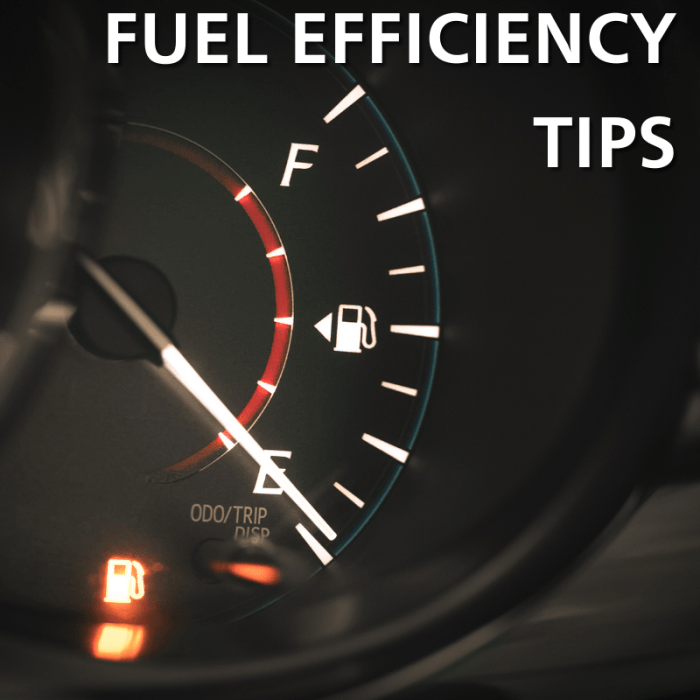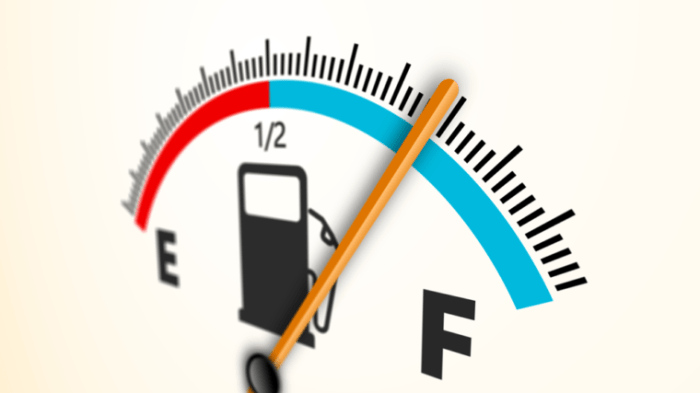Fuel efficiency tips can make a real difference in how you drive and how much you spend at the pump. Get ready to rev up your knowledge on saving fuel in this ultimate guide to fuel efficiency tips!
From the importance of fuel efficiency to smart driving habits and vehicle maintenance, this guide has got you covered with all the tricks and techniques to keep your wheels rolling smoothly and efficiently.
Importance of Fuel Efficiency

Fuel efficiency is crucial for vehicles as it directly impacts both the environment and your wallet. By improving fuel efficiency, you can save money on gas, reduce harmful emissions, and contribute to a cleaner, healthier planet.
Environmental Impact
Improving fuel efficiency plays a significant role in reducing greenhouse gas emissions and air pollution. Vehicles that are more fuel-efficient produce fewer harmful pollutants that contribute to climate change and poor air quality. By driving a fuel-efficient vehicle, you can help minimize your carbon footprint and protect the environment for future generations.
Benefits of Improving Fuel Efficiency
- Save money on gas by using less fuel for your daily commute or road trips.
- Reduce your dependency on fossil fuels, which are finite resources.
- Contribute to a cleaner environment by emitting fewer pollutants into the air.
- Extend the lifespan of your vehicle by reducing wear and tear on the engine.
- Help combat climate change by lowering your carbon emissions.
Driving Habits
When it comes to fuel efficiency, your driving habits play a crucial role in determining how much gas your vehicle consumes. By making some simple adjustments to your driving style, you can significantly reduce your fuel consumption and save money in the long run.
Impact of Speeding on Fuel Consumption
Driving at high speeds can have a detrimental effect on your fuel efficiency. The faster you drive, the more wind resistance your vehicle encounters, causing it to burn more fuel. In fact, according to the U.S. Department of Energy, every 5 mph you drive over 50 mph is like paying an additional $0.24 per gallon for gas. To improve your fuel efficiency, try to maintain a steady speed and avoid unnecessary speeding.
Reducing Aggressive Driving for Better Fuel Efficiency
Aggressive driving habits such as rapid acceleration, abrupt braking, and excessive idling can also have a negative impact on your fuel efficiency. These actions not only waste fuel but also put unnecessary strain on your vehicle’s engine and brakes. To conserve fuel, try to accelerate and brake smoothly, anticipate traffic flow, and avoid tailgating. By adopting a more relaxed driving style, you can improve your fuel efficiency and reduce wear and tear on your vehicle.
Vehicle Maintenance: Fuel Efficiency Tips
Regular vehicle maintenance plays a crucial role in maximizing fuel efficiency. By taking care of your car properly, you can ensure that it runs smoothly and consumes fuel more efficiently. This not only saves you money in the long run but also helps reduce your carbon footprint.
Proper Tire Inflation, Fuel efficiency tips
Proper tire inflation is essential for saving fuel. Underinflated tires create more rolling resistance, causing your engine to work harder and burn more fuel. Make sure to check your tire pressure regularly, especially before long trips, to ensure they are properly inflated. According to the U.S. Department of Energy, you can improve your gas mileage by around 0.6% for every 1 psi increase in all four tires.
Clean Air Filter Maintenance
Maintaining a clean air filter is another key factor in improving fuel economy. A dirty air filter can restrict airflow to the engine, making it work harder and reducing fuel efficiency. It is recommended to inspect and replace your air filter according to your vehicle manufacturer’s guidelines. By keeping a clean air filter, you can ensure that your engine receives enough air for combustion, leading to better fuel economy and performance.
Fuel-Efficient Driving Techniques

To maximize fuel efficiency, it’s essential to adopt specific driving techniques that can help you save gas and reduce your overall fuel consumption.
Coasting to Save Fuel
- Coasting involves taking your foot off the accelerator and allowing the vehicle to glide without using any gas.
- This technique can be used when approaching a red light, going downhill, or when driving at a consistent speed on a flat road.
- By coasting, you can significantly reduce fuel consumption and increase your vehicle’s overall efficiency.
Smooth Acceleration and Deceleration
- Gradually accelerating and decelerating can help improve fuel efficiency by reducing the strain on the engine.
- Avoid sudden stops and starts, as they can lead to increased fuel consumption and wear and tear on your vehicle.
- By maintaining a steady pace and smoothly transitioning between speeds, you can optimize your fuel usage and save money at the pump.
Benefits of Using Cruise Control
- Cruise control helps maintain a constant speed on highways, preventing unnecessary fluctuations that can impact fuel efficiency.
- By setting a consistent pace, you can reduce fuel consumption and improve your vehicle’s overall performance on long drives.
- Using cruise control also allows you to focus more on the road ahead and less on maintaining speed, leading to a safer and more fuel-efficient driving experience.